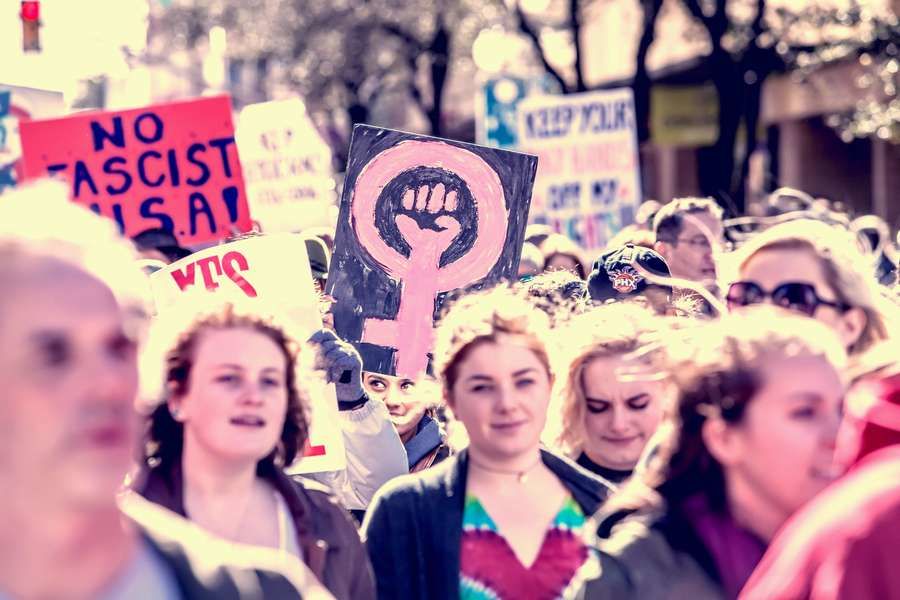Atlanta, Ga., Oct 27, 2017 / 03:07 pm (CNA).- Today, October 27, the organizers of January’s historic Women’s March are starting their convention in Detroit with the theme “Reclaiming Our Time.” But while the event was covered in the news, is it really “new” that women are doing just that?
The theme reminds me of a proclamation from Pope Paul VI at the Second Vatican Council, “the hour is coming, in fact has come, when the vocation of woman is being achieved in its fullness, the hour in which woman acquires in the world an influence, an effect and a power never hitherto achieved.”
Saint John Paul II expanded on this special quality in his 1995 Letter to Women, noting that women, “perhaps more than men…acknowledge the person.” Through their gift of seeing and acknowledging others, women find new ways to give of themselves, and in doing so, achieve what they were made for: relationship with others.
It is easy to see truth about women at work in the sweeping vision of the Women’s March. Their unity principles state, “We must create a society in which women…are free and able to care for and nurture their families, however they are formed, in safe and healthy environments free from structural impediments.” They seek to build a world in which people of all genders, races, sexual preferences, religions, and abilities are protected and respected and in which the environment is cared for. In a beautiful, feminine way, they connect the welfare of all human beings to each other and clearly recognize the goodness of each person “in their greatness and limitations.”
Yet the movement also misses the mark in some important ways. Sadly, their goals include “open access to safe, legal, affordable abortion and birth control for all people,” and they seem to embrace the view that sexual expression, marriage, and children are independent of each other.
While the movement is comprised largely of women hoping to serve others, its Unity Principles also emphasize a radical sort of “self-determinism” which is very far from the Christian ideal of “finding oneself by losing oneself.” Unsurprisingly, January’s March itself led to disunity- though it was supposed to give all women a voice, the organizers disinvited pro-life women.
And disconnected from that “spiritual beauty” which “God bestowed…in a particular way on women,” vulgarity abounded at the protests.
The Women’s March movement is beautiful, ugly, virtuous, vice-filled, impressive, messy, and in a word — human. It will likely lead to both good and evil: how much of each remains to be seen.
Thankfully, for a woman of faith, “women’s time” does not depend on participating in a huge, visible movement of millions. As John Paul II said, real human social progress “often develops in an inconspicuous way beginning with the daily relationships between people, especially within the family.”
You probably already know “inconspicuous” women who are living their “hour.” I can think of a mom who serves on our town’s city council. I can think of women who are re-envisioning pregnancy care centers through the creation of Guiding Star clinics. I can think of women who spend their days helping others escape domestic violence. I can think of friends who embraced a religious vocation. I can think of a neighbor who decided to offer people on the street a place to get warm one winter and has spent every day since ministering through friendship to the poor, addicted, and prostitutes in my town. I can think of friends who have been through horrible experiences, but who use those experiences to help others. I can think of the many, many women I know who make great sacrifices to raise and educate their children.
I’ve seen the “feminine genius” explode in other pro-woman grassroots efforts, too. One humble movement started in 2012 when two women penned an open letter stating that those who held up contraception as the sum of women’s health, freedom, and equality did not speak for all women.
That letter received tens of thousands of signatures, was read in Congress, and caught the attention of the Daily Show. What started as a letter eventually turned into the Women Speak for Themselves movement, uniting women around the country who want “to speak…about how women are disadvantaged respecting dating and marriage, especially because of contraception and abortion, and about how to reconnect sex with marriage and children for the good of all people.”
I’m privileged to be a part of this movement, which includes non-religious and religious members, “speaking for myself” with other women through rallies, service days, social media campaigns, and in other ways.
To be sure, there are still obstacles which — in the words of Pope John Paul II — “keep women from being fully integrated into social, political and economic life,” even today. But the good news is that we don’t have to wait for these obstacles to be removed to do good in our communities.
All we must do to live our “hour” is ask of ourselves, “How am I called to serve?” WSFT members, and millions of average women, have been responding to that call for a long time. We’ll keep responding to it. We don’t need to participate in the “Women’s Convention” to know our impact, and our value. Our time has already started and will continue for the good of all people.
.....
rn
rnLaura Doroski is a homeschooling mother to four young children. A graduate of Oglethorpe University in Atlanta, GA, Laura founded the college’s Catholic Student Union and Students for Life. She is a member of Women Speak for Themselves.

